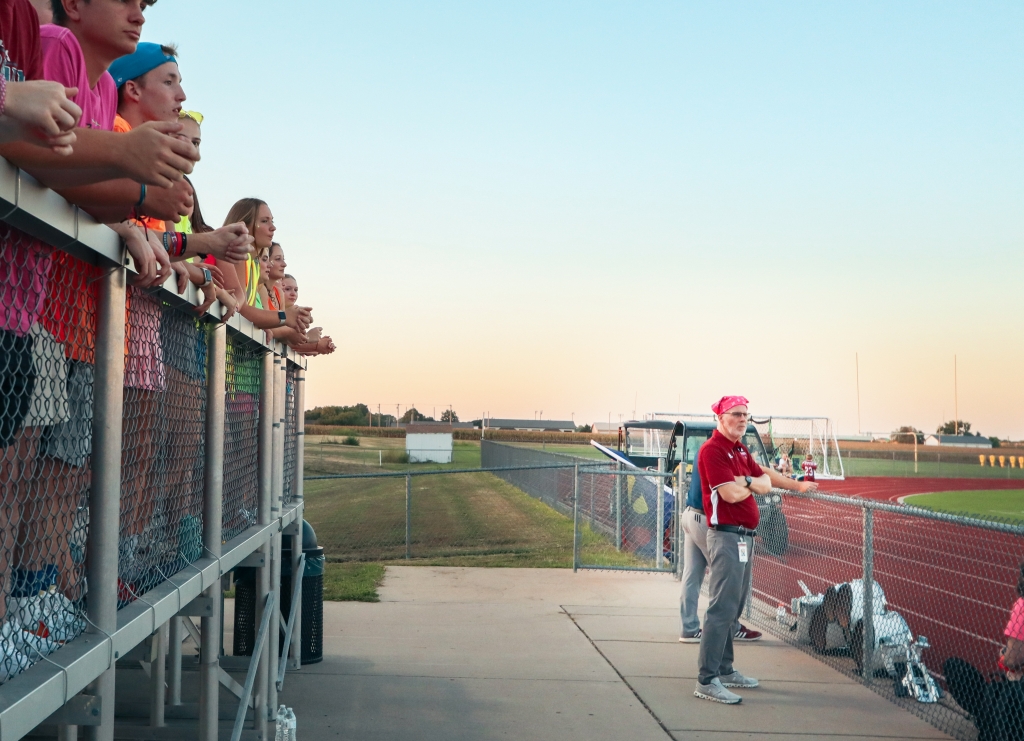Body image

story by Melanie Reese
Is there such a thing as the ‘perfect body’? Who has the perfect body? Do these people have better lives than those who aren’t physically ‘perfect’? Is there such a thing?
In today’s society, the media has created an idealized body image that men and women compare themselves to in order to be considered ‘physically perfect’. Growing up surrounded by magazines, advertisements and social media, teenagers have learned to judge their self-worth based on the unrealistic standards of social media and everything from television to magazines.
“I think the expected body image has evolved,” said Maggie Durkin, Sr. “I think society decided that you need to be a small girl, a petite girl. Now though, I think it has evolved to someone who is still skinny, but is still full. They want you to be full in certain places but skinny in the waist area. I think it is a harder expectation to reach.”
Society has been shaping these standards for years. Examples of ‘perfect body’ promotion can be seen anywhere from Nike posters to the annual Victoria’s Secret Fashion Show.
“The Victoria’s Secret Fashion Show. You see these beautiful who women who are slim and gorgeous,” said Taylor Huff, Sr. “And I’m like, ‘Man why can’t I look like that?’ And I begin to question myself, like, ‘Where did I go wrong?’”
The proliferation of unrealistic body expectations has had a harsh effect on this generation. According to Heart of Leadership, more than 90 percent of girls aged 15 – 17 want to change at least one aspect of their physical appearance with weight ranking the highest. The standard acceptance for weight socially can affect the self-esteem of girls of any age.
“In either fourth or seventh grade, I remember one time I was able to fit in my mom’s pants,” Samantha Gregory, Soph., said. “I started crying and my mom came in and I told her I didn’t want to go to school that day because I was too fat.”
Not only do girls want to change their current body sizes, but 80 percent of children who are ten years old are afraid of being fat, according to Heart of Leadership. The stressed body image of the society to be skinny not only affect the adults and young adults, but children as well.
“I started to compare myself from when I got my first Barbie doll at age five,” said Holland Harvat, Soph. “The Barbie doll was super skinny and I was upset that I didn’t look like that.”
Body size affects young children as well as teenagers.
“We have a family friend who has a five year old girl who recently told her mom that she doesn’t like looking in the mirror,” said Maggie Durkin, Sr. “I think it’s sad that even at such a young age that body image is a thing. I think instead of teaching people the kind of bodies they should have we should be teaching them to love their bodies. You can be healthy and not still have the perfect body.”
Models, actresses, and athletes all play a role in society’s form of body image. Images and videos that are seen everywhere from Twitter, Instagram to magazines and advertisements all create a whirl of self doubt in the minds of teenage girls. This doubt can overshadow girls’ self confidence. Which in effect, causes self image to plummet based on the socially accepted idea on what a perfect body should be and the lack thereof.
The media may not always be the primary cause of self doubt of self body image. Peer judgement is often a contributing factor as well.
“One time I was borrowing my friends clothes and she told me that I couldn’t borrow her leggings because I would stretch them out,” said Maggie Durkin, Sr. “It made me feel like I was massive because she let all of her other friends borrow them except for me.”
The pressures for a perfect body have swayed people to try to change their lifestyles in order to look a certain way. According to Heart of Leadership, 80 percent of ten year old girls have attempted to lose weight by restricting their diet while 90 percent of high schoolers diet. The Council on Size and Weight Discrimination found that more young girls are more afraid of becoming fat than they are of nuclear war, cancer or losing their parents.
Not only are girls changing the way they might eat, but also reconsidering their physical activity based on body size.
“I wanted to improve my vertical and my strength but also how I looked,” said Holland Harvat, Soph. “So I would run rather than do cleans or sprints. Even though I needed to improve my vertical and quickness cleans and sprints would add more muscle tone. And instead I would go jogging and train my low muscle twitch fibers because I would rather have the body than the skills.”
Though it may seem more common for girls to pressure themselves to attain the idealized figure, boys are in a similar situation. The national monthly news magazine The Atlantic states that among boys who are highly concerned with their weight, half are worried about gaining muscle, a third are concerned with both thinness and muscularity and less than fifteen percent are only concerned about thinness.
“Growing up I was always a small guy,” said Chase Dressler, Sr. “I was always the second shortest kid in school. When I finally got taller my freshman year I started lifting weights to get bigger. Now that I am it has definitely boosted my self confidence.”
The pursuit of an ideal image for guys influences their exercise routines and in many cases serves as a motivation to begin a structured routine in the first place.
“I wouldn’t say that I don’t enjoy exercise in general,” said Max Johnson, Sr. “But I definitely changed my routine pretty drastically. I went from basically only exercising in sports to lifting every day.”
Social media has defined an unrealistic set of standards for males and females to reach to be physically desirable, causing self-esteem and confidence issues nationally. Heart of Leadership found that seven in ten girls believe that they are not good enough or do not measure up in some way including their looks, performance in school and relationships. Somehow, these standards have caused humans to believe that they are worth less than others based on physical characteristics.
“You’re born the way you are and trying to drastically change your body is trying to change you as a person,” said Maggie Durkin, Sr. “They need to learn to love themselves and I know that’s hard. Even now I don’t fully love myself. I think when you find a way to fully love yourself then it’s easier to live.
“Changing your body won’t change your future. Getting skinnier won’t change your career, getting a bigger butt won’t affect the person you’ll marry because if it is then that’s not love. In the end, changing your body won’t affect the outcome of your future.”







